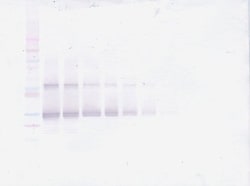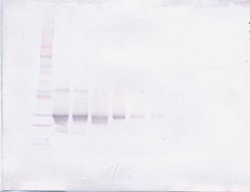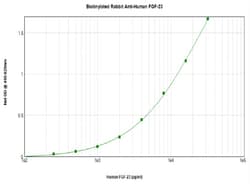Learn More
PeproTech FGF23 Polyclonal Antibody, Biotin, PeproTech®, Invitrogen™

Description
AA Sequence of recombinant protein: MYPNASPLLG SSWGGLIHLY TATARNSYHL QIHKNGHVDG APHQTIYSAL MIRSEDAGFV VITGVMSRRY LCMDFRGNIF GSHYFDPENC RFQHQTLENG YDVYHSPQYH FLVSLGRAKR AFLPGMNPPP YSQFLSRRNE IPLIHFNTPI PRRHTRSAED DSERDPLNVL KPRARMTPAP ASCSQELPSA EDNSPMASDP LGVVRGGRVN THAGGTGPEG CRPFAKFI Preparation: Produced from sera of rabbits immunized with highly pure Recombinant Human FGF-23. Anti-Human FGF-23-specific antibody was purified by affinity chromatography and then biotinylated. Sandwich ELISA: To detect Human FGF-23 by sandwich ELISA (using 100 μL/well), a concentration of 0.25-1.0 μg/mL of this antibody is required. This biotinylated polyclonal antibody, in conjunction with PeproTech Polyclonal Anti-Human FGF-23 (500-P319) as a capture antibody, allows the detection of at least 2000-4000 pg/mL of Recombinant Human FGF-23. Western Blot: To detect Human FGF-23 by Western Blot analysis, this antibody can be used at a concentration of 0.1-0.2 μg/mL. When used in conjunction with compatible development reagents, the detection limit for Recombinant Human FGF-23 is 1.5-3.0 ng/lane, under either reducing or non-reducing conditions. 500-P319BT-1MG will be provided as 2 x 500 μg

Specifications
Specifications
| Antigen | FGF23 |
| Applications | ELISA, Western Blot |
| Classification | Polyclonal |
| Conjugate | Biotin |
| Formulation | PBS with no preservative |
| Gene | FGF23 |
| Gene Accession No. | Q9GZV9 |
| Gene Alias | ADHR; FGF; Fgf23; FGF-23; FGFN; Fibroblast growth factor; Fibroblast growth factor 23; Fibroblast growth factor 23 C-terminal peptide; Fibroblast growth factor 23 N-terminal peptide; HPDR2; HYPF; Phosphatonin; PHPTC; tumor-derived hypophosphatemia inducing factor; Tumor-derived hypophosphatemia-inducing factor; UNQ3027/PRO9828 |
| Gene Symbols | FGF23 |
| Host Species | Rabbit |
| Show More |
By clicking Submit, you acknowledge that you may be contacted by Fisher Scientific in regards to the feedback you have provided in this form. We will not share your information for any other purposes. All contact information provided shall also be maintained in accordance with our Privacy Policy.




